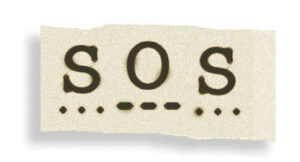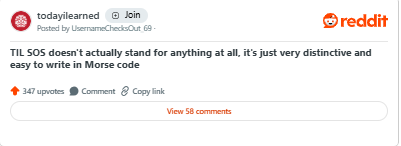What Does SOS Actually Stand For? Spoiler: It Doesn’t
Let’s cut straight to the chase — you’ve probably gone your entire life thinking “SOS” stands for “Save Our Ship” or “Save Our Souls,” right? You’re not alone. That’s what most people assume. It feels logical. It sounds official. And hey, it makes for great movie drama.
But here’s the kicker: those meanings were never real to begin with. Seriously. SOS doesn’t officially stand for anything. The truth behind this iconic distress call is way more interesting — and way simpler — than the dramatic phrases we’ve all come to believe.
The Origins of SOS: Why Simplicity Saved Lives
Back in the early 1900s, communication at sea relied heavily on Morse code — you know, the old-school system of dots and dashes that turned tapping into talking. Ships needed a way to send out a universal distress signal, fast and clear, especially when lives were on the line.

So, in 1908, Germany adopted “SOS” as the international distress signal, and the rest of the maritime world soon followed. But they didn’t choose those letters for poetic reasons. Nope. They chose them because in Morse code, SOS is dead simple:
- S = · · ·
- O = — — —
- S = · · ·
That’s three dots, three dashes, three dots — a clean, unmistakable rhythm that cuts through noise and confusion like a foghorn in the dark. Easy to tap. Easy to hear. Easy to not mess up.
Video: What Does SOS Actually Mean?
Why Not CQD? And What Even Is That?
Before SOS, the standard distress signal was “CQD,” which sounds more like a radio station than a plea for help. It stood for “All Stations — Distress,” but it wasn’t nearly as intuitive in Morse code. The British even clung to CQD for a while, but eventually gave in because, well… SOS just worked better.
The tipping point? The Titanic disaster in 1912, where both CQD and SOS were used during radio transmissions. After that, SOS became the gold standard — not because it had a dramatic meaning, but because it was fast, clear, and saved precious seconds in life-or-death moments.
Backronyms: How Meaning Got Added Later
So where did “Save Our Ship” and “Save Our Souls” come from?
Short answer: people made them up. Yep, those are what’s called backronyms — invented meanings applied after the fact to help people remember something. And while they’re clever, they’re not official in any way.
The real meaning behind SOS was never about words. It was about efficiency. But over time, our brains love attaching stories to symbols, and let’s face it — “Save Our Ship” sounds way cooler than “this is just a convenient combo of dots and dashes.”

The Internet Reacts: Wait… What?!
In recent months, social media has rediscovered the truth about SOS, and reactions have ranged from amused to downright shocked. People are posting their own hilarious versions, like:
- “Save Our Sausages”
- “Stop Our Sinking”
- “Send Over Snacks”
- “Somebody, Oh Somebody!”
And honestly? We’re here for it. It’s the internet being the internet — taking a revelation and spinning it into comedy gold.
Still, the fact remains: the letters SOS were never about ships or souls. They were about sound. About survival. About being heard loud and clear when everything else was falling apart.
Why SOS Still Works Today
Despite being over a century old, SOS remains instantly recognizable. It’s simple, adaptable, and works across all sorts of platforms — radio, visual signals, light flashes, even written in the sand if you’re stranded on an island.
And guess what? Even if someone doesn’t know Morse code, they’ll probably still understand SOS means “Help!” That’s the kind of legacy you can’t fake. It’s become embedded in global consciousness — a signal of urgency no matter what language you speak.
Video: This is an S.O.S. Kevin Jonas just shocked the internet with his latest reveal.
The Power of Design Over Drama
There’s something kind of beautiful about this whole story. SOS was chosen not for flair, but for functionality. It didn’t need fancy meaning or complex language. It just needed to work — and it did.
It’s a reminder that sometimes, the most powerful things in life aren’t poetic or perfect — they’re practical. They’re designed to cut through chaos and say what needs to be said without saying too much.
And ironically, in a world obsessed with meaning, SOS proves that sometimes being useful is more important than being symbolic.
Conclusion: SOS Was Never About Words — It Was Always About Clarity
So, next time someone confidently tells you SOS means “Save Our Ship,” you’ve got the inside scoop. The truth? It never officially stood for anything — and that’s exactly why it worked.
It was fast. It was clear. It was unmistakable. And in moments when seconds mattered most, those simple dots and dashes carried more weight than a hundred words ever could.
That’s the real story behind SOS — not some dramatic slogan, but a beautifully smart design meant to save lives. And honestly? That’s even cooler.